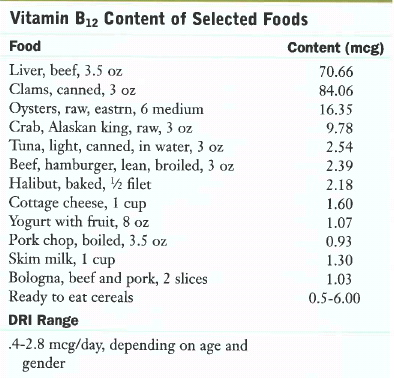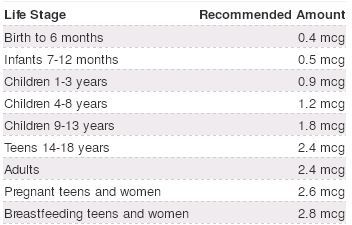Cobalamin (Vit B12) - An Essential Micro-nutrient
Aug 13, 2019
11047 Views
A Quick Look Through Cobalamin (Vit B12):
Vitamin B12 is an essential micronutrient that belongs to a group of water-soluble vitamins. It is also known as cobalamin and plays a considerable role in the cellular metabolism of the human body. B12 is a co-factor in the synthesis of DNA and amino acid metabolism. It plays a huge role in the proper functioning of the nervous system and in the maturation of bone marrow. Nutritional deficiency of this vitamin is linked to issues like cancers, macrocytic anaemia, cardiovascular diseases, and neurological issues. Deficiency of this vitamin is also linked with factors like environment, food, and genes. The absorption and transportation of this vitamin depends on binding proteins like transcobalamin II (TC), intrinsic factor (IF), and haptocorrin (HC). Genetic predisposition may change the status of this vitamin by targeting the proteins that play a role in its absorption, intracellular metabolism, and uptake of cellular components. One research study on monozygotic and dizygotic twins reported that B12 heritability levels are at an estimated 59%. Currently, genetic research on vitamin B12 report that single-nucleotide polymorphisms (SNPs) in gene clusters interact with the environment and change the status of B12. Three major SNPs that reached threshold were found in the neuroblastoma breakpoint family NBPF3 and ∼12–50 kb upstream of the tissue nonspecific alkaline phosphatase. A majority of these SNPs related to B12 can be analyzed by a candidate-gene approach. Technological advancements have enabled the use of the unbiased genome-wide association (GWA) for studying the DNA sequence variations in the human genome and the associated risk of a disease. In spite of everything, the complicated relationship between genotype of an individual and vitamin B status requires better understanding (Surendran, S et al, 2018).
Sources of Vitamin B12:
Cobalamin is usually produced by bacteria, but the vitamin released from the microflora is not absorbed in the colon. Milk, eggs, fish, cheese, liver, kidney, and muscle meat are good sources of vitamin B12. More than 70% activity of this vitamin is preserved while cooking most foods. This is because the vitamin is mainly seen in foods attached to a protein. Some loss of vitamin occurs when milk is subjected to evaporation or pasteurization. The table below has more details.

(Source: Chapter 3, The Nutrients and Their Metabolism, Mahan, L. Kathleen. Krause’s food, nutrition, & diet therapy. Ed. Sylvia Escott-Stump. Vol. 11. Philadelphia: Saunders, 2004).
How Much Of Vitamin B12 Is Required?
The daily requirements of Vitamin B12 vary with age. Daily recommendations for various age groups by the National Institutes of Health (NIH), USA, have been shared below for your reference.

Risk Factors of Vitamin B 12 Deficiency:
The following are the factors that may put you at a high risk of Vitamin B12 deficiency:
- Vegetarians who are unable to acquire the required amount of Vitamin B12 from their regular diet, since B12 is predominantly found in animal foods
- People who are in their old age
- People who are addicted to alcohol
- People with gastrointestinal disorders and those who’ve had gastrointestinal surgery
- People with pernicious anaemia
- Improper intake of food by the infants and expecting mothers
- Surgeries that removed a part of your stomach, which absorbs B12
- Taking medications for issues like indigestion, acidity, and diabetes
Did you know?
Cobalamin plays a crucial role as an enzymatic cofactor in gene expression, immune function and pathogenesis. Explaining in detail, the impact of cobalamin in host-microbiota-pathogen interactions will improve our knowledge on host-microbial homeostasis.
Vitamin-B12 and Gut Health:
Scientific research aimed at studying the human microbiome should lead to a massive shift towards identifying effective treatment options. The notion that humans are not depending on B12 from food seems a bit awkward. Despite all that, gut health is a critical factor in keeping up with good health. In the future, research on probiotic therapies will have more value. A well-planned diet, intestinal treatments and restraining from unwanted antibiotics.
How Can MapmyGenome Help You:
With our proprietary test MyNutriGene, you can get an insight into your immunity, genetic predisposition to specific health conditions, and choose optimal health plans to pre-empt most of these risks. Our test will also help you learn about your metabolism, fat/carbohydrate response, food intolerance, and eating behaviour. Knowing what foods work for you will go a long way towards building better health. It’s time to Eat Wise, DNA Wise! To get this test done, write to info@mapmygenome.in or call us at 1800 102 4595.

